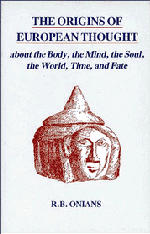Book contents
- Frontmatter
- Contents
- Preface to the first edition
- Preface to the second edition
- Introduction: The Earliest Greeks
- PART I THE MIND AND THE BODY
- PART II THE IMMORTAL SOUL AND THE BODY
- PART III FATE AND TIME
- Chapter I ‘On the Knees of the Gods’
- Chapter II Πείρατα
- Chapter III Καιρός
- Chapter IV The Weaving of Fate
- Chapter V Other Peoples—Fate and Magic
- Chapter VI Μοῖραν ἐπιτιθέναι, πεπρωμένος, etc.
- Chapter VII ʿΥπὲρ μόρον and the Relation of the Gods of Fate
- Chapter VIII The Jars of Zeus, the Scates of Zeus, and the Κῆρες
- Chapter IX Time—Ἦμαρ
- Chapter X Lachesis, Klotho, and Atropos
- Chapter XI Phases of Body and Mind, Sorrow, Sleep, Death, etc.
- Chapter XII Τέλος
- ADDENDA
- Indexes
Chapter V - Other Peoples—Fate and Magic
Published online by Cambridge University Press: 06 August 2010
- Frontmatter
- Contents
- Preface to the first edition
- Preface to the second edition
- Introduction: The Earliest Greeks
- PART I THE MIND AND THE BODY
- PART II THE IMMORTAL SOUL AND THE BODY
- PART III FATE AND TIME
- Chapter I ‘On the Knees of the Gods’
- Chapter II Πείρατα
- Chapter III Καιρός
- Chapter IV The Weaving of Fate
- Chapter V Other Peoples—Fate and Magic
- Chapter VI Μοῖραν ἐπιτιθέναι, πεπρωμένος, etc.
- Chapter VII ʿΥπὲρ μόρον and the Relation of the Gods of Fate
- Chapter VIII The Jars of Zeus, the Scates of Zeus, and the Κῆρες
- Chapter IX Time—Ἦμαρ
- Chapter X Lachesis, Klotho, and Atropos
- Chapter XI Phases of Body and Mind, Sorrow, Sleep, Death, etc.
- Chapter XII Τέλος
- ADDENDA
- Indexes
Summary
Of the two parts of the image traced in Homer, the earlier, the spinning of fate, is so widespread and well known that it scarcely needs illustration. The old Norse goddesses, the Norns, spun the fates of men at birth. The wealth of legend that grew up around this belief would make mockery of any attempt to regard it as a mere figure of speech. The Slavs also had goddesses who performed the like office, e.g. Siwa; so too apparently the ancient Hindoos and the Gypsies. In Roman poetry, where however Greek influences were at work, the spinning of the Parcae at birth is a commonplace. How very real and fundamental this conception was among the Indo-European peoples is clear. In modern Greece fate is still spun by goddesses at birth and in classical times the Μοĩραι divided that office with Εἰλείθυια, the goddess of childbirth. By-forms of these need not trouble us. In Homer, as we have seen, the goddess or goddesses of fate vaguely termed Αἶσα, Μοĩρα, Κλῶθες spun, and there also the time favoured was birth. The last name and the form later more common, Κλωθώ, witness how essential was the image to the representation of fate. More frequently however, but in an exactly similar fashion, Zeus or an indeterminate δαίμων or the vague plural θεοί are introduced as the spinners.
- Type
- Chapter
- Information
- The Origins of European ThoughtAbout the Body, the Mind, the Soul, the World, Time and Fate, pp. 352 - 377Publisher: Cambridge University PressPrint publication year: 1988



